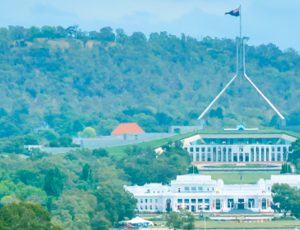Read a snapshot of some of the policy and regulatory updates relevant to the environment in the July to September 2023 quarter across Australia and New Zealand.
Only got 60 secs? Here’s a quick recap
- Australia joins the Climate Club, an alliance of nations that aims to decarbonise industry and pursue net zero emissions by 2050
- The ACCC publishes draft guidance to protect consumers from ‘greenwashing’
- The federal government announces they will work towards a national framework for recycled content traceability in products, including a ‘digital product passport’
- Intergenerational Report indicates climate change and the net zero transformation to dominate lives of future generations
- NSW budget shows encouraging investment in energy and water
Australia joins the Climate Club
While visiting Berlin in July, Prime Minister Anthony Albanese announced that Australia signed up to the Climate Club, an alliance of nations that aims to decarbonise industry and pursue net zero emissions by 2050. The Climate Club was formed last year and is an initiative of German Chancellor Olaf Scholz. At the announcement, Scholz added that Germany and Australia were already cooperating on the production and transportation of green hydrogen, and he looked forward to extending the partnership even further.
Veolia’s position
By joining Germany's Climate Club, Australia expands our reach in regards to impactful energy trade partnerships. International collaboration accelerates renewable energy ambitions, fosters innovation which is vital for emerging technologies such as green hydrogen, and supports Australia’s ability to seize opportunities in the industries of tomorrow. Veolia has committed to be net zero by 2050 and is a signatory to the Science Based Target Initiative’s Business Ambition for 1.5°C. We continue work on our transformative $20-million decarbonisation project.
ACCC takes on greenwashing
In July, the ACCC published draft guidance to improve the integrity of environmental and sustainability claims made by businesses to protect consumers from ‘greenwashing’. It followed the ACCC’s sweep of online marketing which found 57% of businesses reviewed were making potentially misleading environmental claims. ACCC Chair Gina Cass-Gottlieb said, “As consumers become more environmentally conscious, businesses need to be honest and transparent when making environmental or sustainability claims so consumers are not being misled”.
Veolia’s position
In the realm of environmental and sustainability claims, the concept of integrity cannot be overstated. Resource recovery operators, in particular, have grappled with the proliferation of inaccurate or exaggerated assertions regarding sustainability and recyclability in the packaging industry. Veolia strongly encourages brands and manufacturers to meticulously evaluate their products' impact on emissions reduction, energy efficiency, and our natural resources throughout their entire lifecycle. Equally critical is the scrutiny of their utilisation of recycled materials and the ease of recyclability upon disposal by consumers
A national framework for recycled content traceability
The federal government announced that to boost demand and confidence in recycled materials, they will work towards a national framework for recycled content traceability in products. Traceability allows businesses to track recycled content from its origin to its final destination, through the stages of material recovery, reprocessing, manufacturing, distribution and retail. The framework will include a “digital product passport” making clear key information such as where recycled content has come from and how it has been processed and handled.
Veolia’s position
Veolia supports a national framework for content, traceability and sees this as an important step to improving transparency around use of recycled content in products, particularly when this is increasingly becoming a requirement for Australian businesses to access international markets.
Intergenerational Report indicates climate impacts on future generations
The 2023 Intergenerational Report projects the outlook of the economy and the Australian Government’s budget over the coming four decades. The report’s analysis and projections of the key drivers of economic growth help inform and improve public policy settings to better position Australia over the long-term and this year’s report made clear that climate change and the net zero transformation will be a dominating force. This includes affecting where and how future Australians choose to live and work, food and energy security and our environment.
Veolia's position
This report shines a light on the importance of sound and ambitious policy-making now, so that future generations of Australians can avoid higher mitigation costs later. As a leading ESG company globally, Veolia has committed to achieving a 50% reduction in our emissions impact no later than 2032 to align with a 1.5 degree pathway to net zero by 2050. To this end, we are significantly investing in resource recovery infrastructure solutions to move Australia up the waste hierarchy and away from landfills, as our most material-emission source. This includes investment in several Energy from Waste facilities around the country. We are also decarbonising our electricity supply with a proposed $20m investment in solar and commercial battery storage.
NSW budget shows encouraging investment in energy and water
Labor's first NSW budget in more than a decade included $13 billion in cuts and savings, as well as focuses on public services and essential workers. On the environmental front, the budget offered important additional investment in renewable energy infrastructure and upgrading of critical water supply infrastructure.
Veolia’s position
Veolia fully supports the NSW Government investment in renewable energy and water infrastructure. These investments will be crucial to achieving our emissions reduction targets and driving water resilience for the state. In future budgets, we see an opportunity to expand support for complementary infrastructure such as Energy from Waste and Anaerobic Digestion – two key solutions that support the nation's overall carbon emission reduction plans, while also addressing the looming challenges of more sustainable waste management for NSW into the future.





